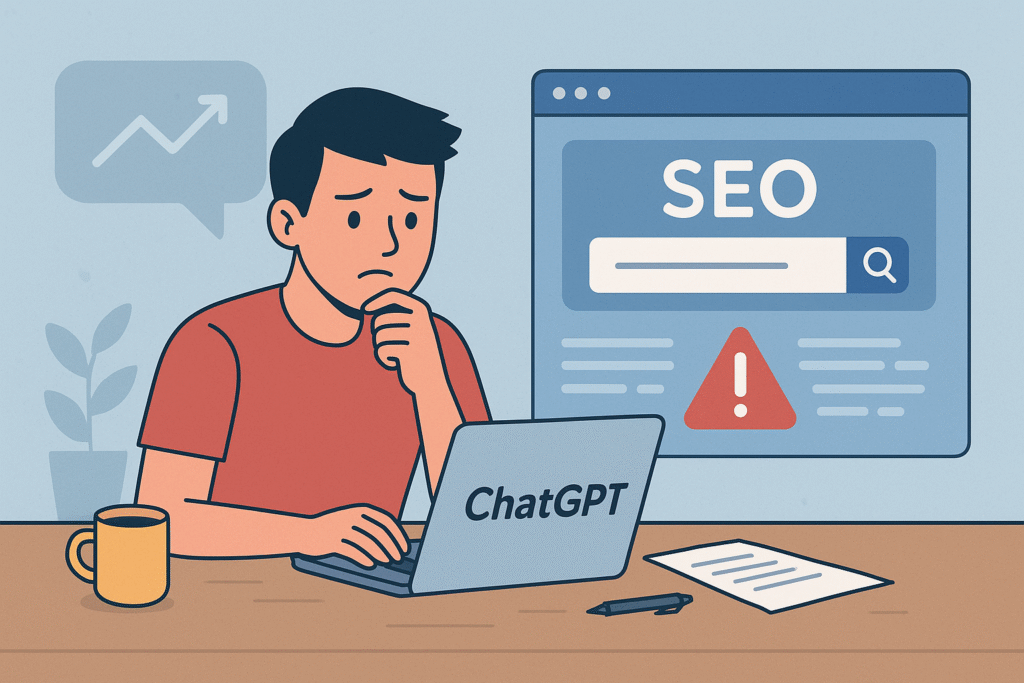The AI Buzz in SEO
Everywhere you look, people are talking about AI. From generating blog posts in seconds to helping with keyword ideas, ChatGPT has become every marketer’s secret weapon. And let’s be honest—it feels magical.
But here’s the catch: using ChatGPT without a strategy can hurt your SEO more than help it. If you rely too much on AI-written content, you could see rankings drop, readers bounce, and trust fade.
So, why is ChatGPT a risk for SEO, and how can you avoid falling into the trap? Let’s break it down.
What is ChatGPT & Why Are Marketers Using It?
ChatGPT is a language model trained to generate text that sounds natural and human-like.
Why marketers love it:
- Saves hours on writing blog posts.
- Helps brainstorm endless content ideas.
- Can draft ad copy, outlines, and FAQs in minutes.
Sounds like a dream, right? But here’s where the problems creep in.
The Bright Side of ChatGPT for SEO
Before we jump into risks, let’s admit the good stuff.
- Faster Content Production → Publish more in less time.
- Keyword Suggestions → AI tools suggest related phrases.
- Content Personalization → You can target different audience needs.
But… too much of a good thing can backfire. And in SEO, Google doesn’t forgive “shortcuts” for long.
The Dark Side: Risks of ChatGPT for SEO
1. Generic & Duplicate Content
AI often churns out text that looks fine but sounds just like everyone else’s. This can trigger Google’s Helpful Content Update, which punishes thin, repetitive content.
2. No Real Expertise (E-E-A-T Problem)
Google cares about Experience, Expertise, Authority, and Trustworthiness (E-E-A-T). AI has zero real-life experiences—it can’t test a product, run a business, or share a personal case study. That’s a red flag for search engines.
3. Over-Optimization
AI sometimes stuffs keywords in unnatural ways. Readers notice. Google notices. Rankings drop.
4. Inaccuracies & Misinformation
ChatGPT doesn’t “know” facts—it predicts them. If unchecked, you risk publishing outdated or flat-out wrong info.
5. Weak Engagement
Readers can tell when content feels robotic. Result? Lower engagement, higher bounce rates, and shorter dwell time—all bad for SEO.
6. Brand Voice Gets Lost
If every blog sounds like ChatGPT, your brand identity disappears.
7. Algorithm Risks
With every update, Google gets better at spotting AI-driven fluff. If your site is full of it, penalties could be coming.
What Google Says About AI Content
Here’s the surprising part: Google doesn’t ban AI content. Instead, it says:
“What matters is the quality of content, not how it’s created.”
Translation: If your AI content is useful, fact-checked, and original, you’re fine. If it’s lazy and generic, you’re in trouble.
How to Use ChatGPT Safely Without Killing Your SEO
If you want the best of both worlds, here’s how to play it safe:
- Always edit & fact-check – Don’t hit publish on raw AI text.
- Add human stories & insights – Share your own experience.
- Blend AI with creativity – Let ChatGPT do the heavy lifting, but keep the human touch.
- Write for people, not bots – Answer real questions, solve problems.
- Show expertise – Add author bios, sources, and unique perspectives.
FAQs: ChatGPT & SEO Risks
Q1: Is AI content against Google’s rules?
No, as long as it’s useful and people-first.
Q2: Can AI-written blogs rank?
Yes, but only if they’re edited and enriched with expertise.
Q3: What’s the #1 risk of ChatGPT for SEO?
Publishing generic, unhelpful content that Google flags as low quality.
Q4: Should businesses avoid AI completely?
No—you just need to balance it with human insight.
Q5: Will Google detect all AI content in the future?
Google’s focus isn’t on “detecting AI,” it’s on rewarding quality content.
Final Thoughts: The Balanced Approach
ChatGPT is a powerful tool—but it’s not a silver bullet. If you depend on it blindly, you risk losing rankings, traffic, and reader trust.
The secret? Use ChatGPT for speed, then add your expertise for value. That’s how you stay safe, keep rankings strong, and stand out in a sea of AI-generated noise.
👉 Want to dive deeper into Google’s stance? Check Google’s official blog on AI content.

